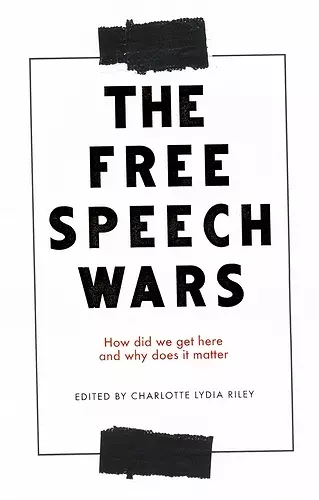The Free Speech Wars
How Did We Get Here and Why Does it Matter?
Format:Paperback
Publisher:Manchester University Press
Published:20th Nov '20
Should be back in stock very soon

Who gets to exercise free speech, and what happens when powerful voices think they have been silenced?
Assembling a diverse group of commentators, activists and academics, this book explores the contemporary free speech wars to try to understand how this issue has become increasingly charged. It asks how the spaces and structures of 'speech' – mass media, the lecture theatre, the public event, the political rally and the internet – shape this debate. The contributors examine how acts such as censorship, boycotts, and protests around free speech developed historically and how these histories inform the present.
The book explores the opposing sides in this debate: beginning with a defence of speech freedoms and examining how speech has been curbed and controlled, before countering this with an exploration of the way that free speech has been weaponised and deployed as a bad faith argument by people wishing to commit harm. Considering two key battlefields in the free speech wars – the university campus and the internet – this book encourages the reader to be suspicious of the way that this topic is framed in the media today. The free speech wars offers context, provocation, stimulation and – hopefully – a route through this conflict.
'If you’d like to understand what on earth is really going on when politicians and commentators these days pontificate about “censorship”, “cancel culture”, “no-platforming”, “safe spaces” and the rest, it’s an excellent place to start.'
The Guardian
'This collection of essays by an eclectic group of mostly European scholars is not a legalistic examination of free speech court cases and legislation. Instead, it examines free speech issues from philosophical, historical, and sociological perspectives. There are no references to legal scholars but rather to such thinkers as Jürgen Habermas, Socrates, and Voltaire, among others. The book is neatly organized into four sections dealing with threats to free speech, the use of free speech as a weapon, the role of universities in the free speech debate, and the internet as the Wild West of free speech. Readers will find that many of the essays can serve as conversation starters for contemporary topics, such as free speech’s relationship to racism, trigger warnings, and marginalized groups. A recurring theme across many essays is the use of free speech by the powerful as a tool of oppression. This book provides useful criticism through a European perspective unfamiliar to most American students.
Summing Up: Recommended. Advanced undergraduates and graduate students.'
D. Caristi, Ball State University, CHOICE 60.1 (September 2022)
ISBN: 9781526151162
Dimensions: 198mm x 129mm x 16mm
Weight: 295g
296 pages